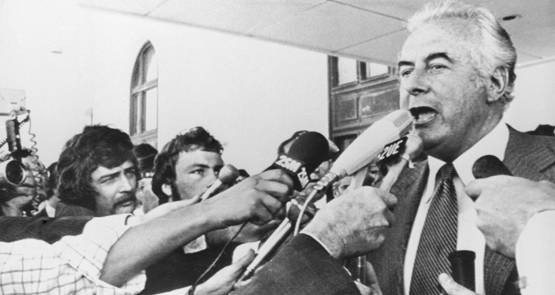
A Federal Court case launched against the National Archives calling for the release of the “Palace letters” quietly achieved a historic milestone this month. It might have seemed a routine, even unremarkable, short preliminary hearing in the Phillip Street courtroom 21B, and yet the implications of the commencement of proceedings are anything but.
The Palace letters, between the Queen and Sir John Kerr, governor-general at the time of the dismissal of the Whitlam government, are designated “personal” and embargoed until 2027 “at the instruction of the Queen”, after which they can only be released with the Queen’s approval. With the Federal Court case under way, however, the release of the Palace letters will now be determined by an Australian court and according to Australian law — and not by the Queen, “a foreign monarch,” in the words of Prime Minister Malcolm Turnbull.
[What’s she hiding? The secret documents that detail the Queen’s involvement in the Dismissal]
This is a dramatic development, a reassertion of Australian sovereignty over these critical documents in our history, despite long-standing claims of royal control. It has been just five weeks since I commenced this Federal Court action against the National Archives of Australia, with the support of a team of lawyers working on a pro bono basis and with an important crowdfunding campaign to raise funds to provide some protection against the possibility of an adverse cost order. The response to the campaign has been exceptional, and we have already reached the halfway mark in our target. This generous public support is vitally important to enable the case to go through to the highest judicial level required. The next big date in the legal calendar to release the Palace letters will be a directions hearing on February 14, 2017, in the Federal Court in Sydney.
The Palace letters case has brought to light a lingering relic of colonialism few knew existed — the correspondence between the British monarch and the governor-general — which is closely guarded as a post-colonial royal privilege and kept secret even from the Australian prime minister. The continued existence of this arcane imperial political presumption is astounding and completely at odds with a modern parliamentary democracy. The Palace letters case will end this colonial exemplar of royal secrecy once and for all, by ensuring that the public access provisions of the Archives Act are applied to all official records, including the letters between the Queen and the governor-general. For the first time since federation, this correspondence will no longer be controlled by the British monarch and will be brought under existing Australian law, to be released after 30 years, in accordance with the Archives Act if they are found to be official, not personal, records.
The implications of this case are considerable and go beyond the immediate issue of access to secret material relating to the dismissal of the Whitlam government, important though that clearly is. The Palace letters case raises fundamental and broader issues of royal secrecy in a parliamentary democracy, in particular of the practice of members of the royal family in the United Kingdom to engage in secret communications with government about political matters to which the public is denied access. This has been the focus of recent concern in the United Kingdom, where the similar designation of documents in the royal archives as “personal” and “private” has long ensured their protection from public view.
[What did the Queen know about the Dismissal? Time to release the Palace letters]
In a further development in the Palace letters case, the Labor member for Bruce, Julian Hill, raised concerns over the Queen’s continued control of the letters in a strong statement in the House this week. Hill observed that, “the very notion of ‘personal’ letters between the Monarch and the governor-general offends all concepts of transparency and democracy”. Hill has put forward a private members motion for debate calling on the government to take steps to secure the release the Palace letters, as “a matter of our national history which should be made available to the Australian people”. Hill’s motion on the Palace letters will be debated on Monday 28 November, with the Shadow Attorney-General, Mark Dreyfus QC, also speaking to it.
This parliamentary debate marks a significant moment in the campaign to release the Palace letters. With political and public pressure growing, the continued secrecy over correspondence between the monarch and the governor-general at such a critical time in our history is looking increasingly precarious.
*This article was originally published at John Menadue’s Pearls and Irritations
*Professor Jenny Hocking, Whitlam biographer, is the author of Gough Whitlam: A Moment in History, Gough Whitlam: His Time and The Dismissal Dossier: Everything You Were Never Meant to Know About November 1975.







Isn’t the Monarch in question actually the Queen of Australia?
Which suggests that deciding the release of any correspondence between the Queen of Australia and the Governor-General of Australia falls within the jurisdiction of the Australian Government and the Australian High Court.
Bill Cushing
Very good news Jenny. All power to your elbow.